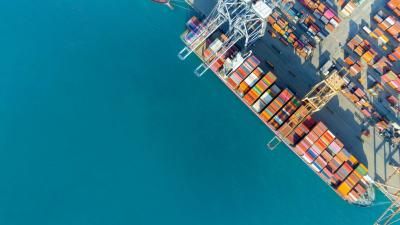
First ever Lloyd’s Register Foundation-funded fellows join the World Maritime University
Mithilesh Kumar and Faith Maraga have been provided with a life-changing Lloyd’s Register Foundation-fellowship to complete an MSc in Maritime Affairs.
This page is approximately a 5 minute read
This page was published on

The ocean is the world’s largest ecosystem, covering 70% of the earth’s surface and home to an estimated 80% of the planet’s biodiversity. It has a critical role to play in the transition to a net-zero, resilient, and equitable economy, and in addressing the triple planetary crises of climate change, biodiversity loss, and pollution.
Research shows that ocean-based mitigation solutions could reduce the greenhouse gas emissions (GHG) gap by as much as one-fifth as we look to limit global temperatures to a 1.5° C increase by 2050. Furthermore, with nine billion people expected in the world by mid-century, the demand for food, jobs, energy, raw materials, and economic growth will increase. The ocean economy including shipping and ports, marine renewable energy, aquaculture and fisheries, infrastructure and tourism all have a role to play in addressing food security, climate mitigation and energy production, while protecting livelihoods and much more. Achieving industry growth in a way which ensures the long-term sustainability of the ocean economy – and the safety of those who work in it – is critical.
In 2020, Lloyd’s Register Foundation funded the appointment of Lloyd’s Register’s Head of Sustainability, Suzanne Johnson, as Senior Oceans Advisor to the UN Global Compact (UNGC), where she leads the blue-finance initiative for the Ocean Stewardship Coalition, supporting its work to advance a more sustainable ocean economy.
This appointment underlines the Foundation’s commitment to raising awareness of safety-related challenges and what’s needed to solve them, building coalitions for change, and funding programmes around the world to keep people safe from harm.
Over the last three years, Suzanne has played an integral role in advocating for a climate-resilient future, where we sustainably manage, use, and protect ocean resources.
“The development of a sustainable blue economy is integral to creating a brighter future, where a healthy ocean supports people and planet, and contributes significantly to stabilising the climate. Scaling-up finance and working directly with financial institutions to unlock mainstream funding is key to steering ocean-linked industries towards a future that restores, protects, and maintains diverse, productive, and resilient ecosystems,” says Suzanne.
“Sustainable ocean finance can redirect funds from potentially harmful activities to the development of blue solutions that address issues such as rising oceans, climate change, pollution, and loss of biodiversity. Despite developments in the field of ocean finance over the last decade, the sustainable ocean economy finance gap is growing faster than overall investment.”
The blue economy is valued at around $2.5 trillion dollars each year, making it the world’s seventh largest economy based on GDP, supporting the livelihoods of approximately three billion people globally. Despite this, the Sustainable Development Goal (SDG) 14, remains the lowest funded goal. The UN estimates that the world will need to spend between three and five trillion annually (around 3%) of GDP to meet the SDGs by 2030. A systemic shift is needed to grow the blue economy and sustain economic health and an ocean community.
“We are in an important period of change. In December 2022, we saw the agreement of the 2030 Global Biodiversity Framework, including a target to protect at least 30% of the world’s land and ocean by 2030,” adds Suzanne. “The new UN High Seas Treaty features provisions to allow for the fair sharing of knowledge, technologies, and benefits from marine genetic resources, alongside establishing a legal framework for the creation of Marine Protected Areas in international waters. Most recently the revised IMO GHG strategy envisions a reduction in carbon intensity of international shipping, which will increase investment opportunities in decarbonised shipping. Yet the financial sector and the industries they serve need a further push, to better realign the global economy, by growing the blue economy to sustain ocean, community, and economic health.”
With over 20 years’ experience in the energy and maritime sector, Suzanne is a recognised sustainability expert and established thought leader. Her work championing blue finance at major global events, including with the World Bank, the UN and major investment banks, funds, foundations, and NGOs has brought forward critical commitments across government and private sector funding in the ocean space.
She comments: “As we approach the UN Ocean Conference in 2025, the focus must be on building the market and supporting the scale-up of ocean investments. One area of focus will be enabling an ocean investment ecosystem, through the establishment of a clear set of frameworks, standards, incentives, and tools to support blue finance. While a lot has already been achieved, including practitioner guides to blue bonds and the establishment of the UN Global Compact Sustainable Ocean Principles, there is room for evolution by coalescing around globally recognised standards, metrics, and data to measure impact."
“By working closely with key players in the finance value chain and other UN institutions such as the United Nations Environmental Program Finance Initiative and building an increasing community of key stakeholders, we can continue to build ocean finance knowledge amongst private sector leaders, the finance value chain, policymakers, and regulators to increase sustainable ocean investments.”
“Funding safe and sustainable ocean related projects is essential if we want to protect our oceans while meeting the needs of a growing society. Lloyd’s Register Foundation recognises the critical role that finance can play in meeting the needs of SDG 14, and in ensuring sustainability criteria, industry standards and guidelines are embedded in blue bonds, loans, and other innovative blue finance mechanisms to ensure sustainable and inclusive ocean industry development. Suzanne is providing an invaluable contribution to convening these discussions and has helped facilitate the progress we’ve seen to date which will contribute to both economic growth and improved – and safer – livelihoods.”
To find out more about the United Nations Global Compact visit: https://unglobalcompact.org/
To find out more about Ocean Stewardship Coalition visit: https://unglobalcompact.org/take-action/ocean
For further information on the ocean economy and Suzanne’s work, visit here.